This article needs additional citations for verification .(June 2024) |
The Boisrond-Canal affair was a diplomatic crisis between the United States and Haiti which ran for five months from May 15 until October 5, 1875.
This article needs additional citations for verification .(June 2024) |
The Boisrond-Canal affair was a diplomatic crisis between the United States and Haiti which ran for five months from May 15 until October 5, 1875.
Haitian general and senator Pierre Théoma Boisrond-Canal was among the band of young leaders who in 1869 successfully ousted the former Haitian President Sylvain Salnave from power. The following year, Boisrond-Canal retired from the military to his farm in Frères, a short distance from Pétionville, and was elected to the Senate of Haiti.
General Michel Domingue was elected president in 1874, and yielded success in securing a treaty of friendship with the Dominican Republic, but Haiti's domestic financial situation was devastating. Domingue tried to negotiate a loan with France, which would strain Haitian finances for years. As a result, corruption and fraud were so great that Boisrond-Canal publicly criticized this financial policy and the loan. To distract the public, Domingue issued a decree, dated May 15, 1875, for the arrests of Generals Brice, Pierre Monplaisir Pierre, and Boisrond-Canal, alleging that the three were plotting a conspiracy against his government.
According to Jacques Nicolas Léger:
Monplaisir Pierre, with gun in hand, met the soldiers who were sent to arrest him; he made an energetic resistance and in defending the entrance to his house was killed in the fight which ensued; Brice, who had also made a brave defense, was successful in reaching the Spanish Consulate, where he died from the effects of a bullet wound in the thigh. Boisrond Canal, who was living on his plantation at Frères, a short distance from Pétionville, was fortunate enough to be able to make his escape before the arrival of those who were commissioned to arrest him, and sought shelter in the United States Legation, which was then situated at Turgeau, a suburb of Port-au-Prince. [1]
Ebenezer Bassett was in his sixth year serving as the United States' fourth ambassador to Haiti and the first African-American ever appointed as an ambassador for the country.
Canal and two young relatives arrived at Bassett's home, seeking protection and refuge. The diplomat agreed to protect them under his diplomatic immunity. "It may be that the instinct for humanity got the better of me," he later wrote to Secretary of State Hamilton Fish. "The men before me were not my personal friends. They had never visited my house before, nor I theirs. I had no merely personal interest in them."[ citation needed ]
The crisis dragged on for several days before Bassett could write to Washington. Reflecting on the issue, Bassett wrote a 21-page dispatch to the Secretary of State. He was optimistic that the government's persecution would ease. He had dealt with numerous cases of refugees in the past, and although some took weeks to resolve, the diplomat had always been successful. He was worried about the government threat. "I must confess that the presence of a thousand armed men around my country residence…with discontent stamped on their faces and Henry rifles in their hands does not quite give the best possible ground to my hope," he wrote to Fish.[ citation needed ]
Fish criticized his Minister for taking in refugees. He responded to Bassett by noting that the Haitian Ambassador to Washington, Stephen Preston, had complained about the refugees.
Fish wanted to resolve the problem quickly. He did not force his envoy to hand over the refugees, however. Despite incurring the wrath of his superiors in Washington, Bassett put all of his credibility on the line:
I am not unaware that the ground taken in my several despatches…may not be in accord with the requirements of public law… but circumstances seemed to crowd in upon me without warning, and in such a way as to leave me almost no choice. Men maddened by passion, inflamed, as I am credibly informed, by rum, and elated by consciousness of armed power, were pursuing their fellow countrymen with red-handed violence. To have closed my door upon the men pursued would have been for me to deny them their last chance of escape from being brutally put to death before my eyes.[ citation needed ]
As a result of the standoff, Bassett's home remained surrounded by over 1,000 soldiers. The nightly rhythm of loud taunts and screams, beating of metal objects, and general nuisance kept the family huddled inside trying to gain a few hours of restless sleep. Bassett first raised the idea of sending a U.S. warship to Haiti in his May 8 despatch first reporting the incident. He argued at the time that such a show of force would exert "a wholesome influence" and strengthen "our own moral force" in resolving the matter.[ citation needed ] As the conflict dragged on for weeks, with both Bassett and Domingue digging in their heels, Washington seemed paralyzed. The diplomat continued to plea for a warship through the summer. But Fish's pique at his Minister and his continued discussions with Preston, who lobbied hard against sending a ship, left the situation unresolved.
In spite of the displeasure he caused in both capitals, Bassett was seen as a hero by supporters among the Haitian people. The affair energized popular opinion in favor of the United States and raised Canal as a folk hero. "The prevailing sentiment is unmistakably in favor of [Canal], and in our favor, because we have firmly protected him against violence," Bassett wrote. No doubt part of that support for both Canal and Bassett was because of the brutality with which the regime continued to act against any and all presumed opponents. Political arrests and killings continued, and Bassett concluded, "the awful fact stares me in the face that we are all under a reign of terror."[ citation needed ]
By summer's end, it looked as if Secretary Fish had finally had enough. Perhaps a more visible threat, he concluded, would cause the Domingue regime to crack. "It has been determined to apply to the Navy Department to order a man of war to Port-au-Prince with a view to your protection from insult," Fish wrote to Bassett. "That the embarrassing question adverted to may be satisfactorily adjusted before she arrives, is much to be desired."[ citation needed ]
As the ship was preparing to leave, Haitian Ambassador Preston rushed to tell Fish that Domingue was ready to capitulate. Bassett could escort Canal safely out if the warship would turn back and not enter Haitian waters. Fish agreed and instructed Bassett that a deal had been set. He was relieved to receive the news. Finally, just after midnight on October 5, 1875, Canal embraced Bassett and boarded an American-flagged ship, to sail to Jamaica and safety.
As a refugee, Canal had been essentially held captive by the government threat for more than five months. After his departure, Bassett telegrammed the Department of State informing them that the crisis had finally passed: "Refugees amicable embarked and soldiers withdrawn from around my premises yesterday."[ citation needed ]
After a few weeks, Boisrond-Canal returned to Jamaica, where his relationship with Domingue improved so much that he was appointed commander of the army in the Ouest department by President Michel Domingue. On 23 April 1876, Boisrond-Canal replaced Michel Domingue as the first president of the provisional government, before becoming President of Haiti non-provisionally on 17 July 1876. Domingue went into exile in Kingston, Jamaica, where he died a year later. Boisrond-Canal would serve in three separate instances as president of Haiti, significantly influencing politics prior to the U.S. invasion in 1915.
Bassett would leave his post as U.S. ambassador to Haiti upon the end of the Grant administration in 1877, as was customary with a change of hands in government. In spite of any lingering resentment that may have existed in Washington because of his defiant stance, it was impossible for the department not to recognize Bassett's work. Bassett and his family boarded the boat Atlas on December 1, 1877, for the two-week trip to New York City, and Boisrond-Canal was present at the reception to wish Bassett farewell. He was succeeded by John Mercer Langston, another African-American who had established and served as the dean of Howard University's law school and who would later serve as the first black representative from Virginia. Bassett himself would later be appointed by Haitian president Lysius Salomon as Haiti's Consul General for New York City, in which Bassett would serve for ten years. Bassett would also assist Frederick Douglass, a fellow abolitionist who would also later serve for a short time as U.S. ambassador to Haiti.
Septimus Rameau, a relative of Domingue's who was appointed as vice-president and was widely seen as the power behind Domingue's presidency, was accused of being responsible for the deaths of the two generals. He was himself assassinated on a street in Port-au-Prince in 1876.

Henri Christophe was a key leader in the Haitian Revolution and the only monarch of the Kingdom of Haiti.

Jean-Pierre Boyer was one of the leaders of the Haitian Revolution, and the president of Haiti from 1818 to 1843. He reunited the north and south of the country into the Republic of Haiti in 1820 and also annexed the newly independent Spanish Haiti, which brought all of Hispaniola under one Haitian government by 1822. Serving as president for just under 25 years, Boyer managed to rule for the longest period of time of any Haitian leader.

Jean-Jacques Dessalines was the first Haitian Emperor, leader of the Haitian Revolution, and the first ruler of an independent Haiti under the 1805 constitution. Initially regarded as governor-general, Dessalines was later named Emperor of Haiti as Jacques I (1804–1806) by generals of the Haitian Revolutionary army and ruled in that capacity until being assassinated in 1806. He spearheaded the resistance against French rule of Saint-Domingue, and eventually became the architect of the 1804 massacre of the remaining French residents of newly independent Haiti, including some supporters of the revolution. Alongside Toussaint Louverture, he has been referred to as one of the fathers of the nation of Haiti. Dessalines was directly responsible for the country, and, under his rule, Haiti became the first country in the Americas to permanently abolish slavery.

Divisional General Charles Victoire Emmanuel Leclerc was a French Army officer who served during the French Revolutionary Wars. He was the husband of Pauline Bonaparte, the sister of Napoleon. In 1801, Leclerc was sent to Saint-Domingue, where invasion forces under his command captured and deported Haitian leader Toussaint Louverture to France as part of an unsuccessful attempt to reassert French control over Saint-Domingue and reinstate slavery in the colony. Leclerc died of yellow fever during the campaign.

Alexandre Sabès Pétion was the first president of the Republic of Haiti from 1807 until his death in 1818. One of Haiti's founding fathers, Pétion belonged to the revolutionary quartet that also includes Toussaint Louverture, Jean-Jacques Dessalines, and his later rival Henri Christophe. Regarded as an excellent artilleryman in his early adulthood, Pétion would distinguish himself as an esteemed military commander with experience leading both French and Haitian troops. The 1802 coalition formed by him and Dessalines against French forces led by Charles Leclerc would prove to be a watershed moment in the decade-long conflict, eventually culminating in the decisive Haitian victory at the Battle of Vertières in 1803.
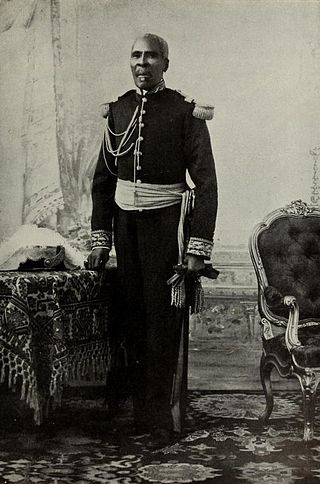
Pierre Nord Alexis was President of Haiti from 17 December 1902 to 2 December 1908.
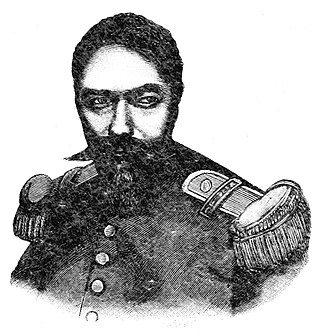
Sylvain Salnave was a Haitian general who served as the President of Haïti from 1867 to 1869. He was elected president after he led the overthrow of President Fabre Geffrard. During his term there were constant civil wars between the various factions. Eventually, he was overthrown in a coup by his eventual successor Nissage Saget, and Salnave was tried for treason and executed.
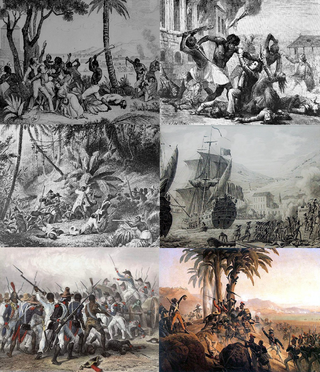
The Haitian Revolution was a successful insurrection by self-liberated slaves against French colonial rule in Saint-Domingue, now the sovereign state of Haiti. The revolution was the only known slave uprising in human history that led to the founding of a state which was both free from slavery and ruled by non-whites and former captives.
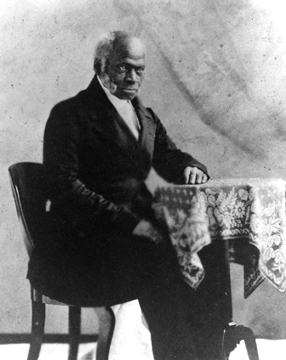
Pierre Toussaint was a formerly enslaved Haitian-American hairdresser and philanthropist, brought to New York City by his enslavers in 1787. He was declared Venerable by Pope John Paul II in 1996.
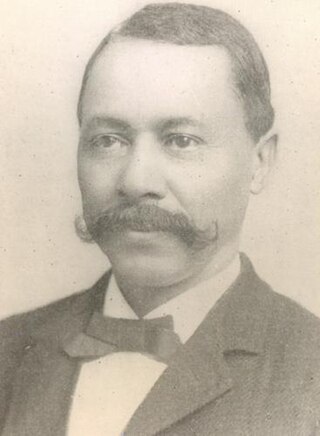
Ebenezer Don Carlos Bassett was United States Ambassador to Haiti from 1869 to 1877. He was the first African American diplomat and the fourth U.S. ambassador to Haiti since the two countries established relations in 1862. His mother was Pequot. From 1857 to 1869 he was the principal of the Institute for Colored Youth in Philadelphia.

Jean-Nicolas Nissage Saget preceded Sylvain Salnave as President of Haiti in 1869. Coming into power by coup, Saget was the first Haitian president to serve out his term of office (1869–1874) and retire voluntarily, although his retirement led to a renewal of the political turmoil between blacks and the country's mulatto elites. He died in 1880.

Michel Domingue served as the president of Haiti from 14 June 1874 to 15 April 1876.

The Haitian occupation of Santo Domingo was the annexation and merger of then-independent Republic of Spanish Haiti into the Republic of Haiti, that lasted twenty-two years, from February 9, 1822, to February 27, 1844. The part of Hispaniola under Spanish administration was first ceded to France and merged with the French colony of Saint Domingue as a result of the Peace of Basel in 1795. However, with the outbreak of the Haitian Revolution the French lost the western part of the island, while remaining in control of the eastern part of the island until the Spanish recaptured Santo Domingo in 1809.

Pierre Théoma Boisrond-Canal was a Haitian politician who served as the president of Haiti three times.
The National Party was an economically nationalist majority Black Haitian political party in Haiti. It was founded in the early 1870s by Septimus Rameau during a time of political reorganization following the civil war of the 1860s. They stood in direct opposition to the Liberal Party, which was dominated by the Mulatto elite.

Dominican Republic–Haiti relations are the diplomatic relations between the nations of Dominican Republic and Haiti. Relations have long been hostile due to substantial ethnic and cultural differences, historic conflicts, territorial disputes, and sharing the island of Hispaniola, part of the Greater Antilles archipelago in the Caribbean region. The living standards in the Dominican Republic are considerably higher than those in Haiti. The economy of the Dominican Republic is ten times larger than that of Haiti. The migration of impoverished Haitians and historical differences have contributed to long-standing conflicts.

Septimus Rameau (1826-1876) was a Haitian politician and vice president who was viewed as the power behind the 1874-1876 presidency of Michel Domingue.
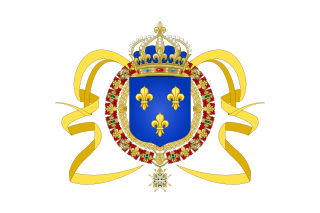
Saint-Domingue Creoles or simply Creoles, were the people who lived in the French colony of Saint-Domingue prior to the Haitian Revolution.
The Liberal Party, founded on February 19, 1870, by Jean-Pierre Boyer Bazelais and Edmond Paul, was an economically liberal political party in Haiti that advocated for technocratic leadership, well embodied in its motto "Government by the Most Competent". Central to the party's ideology was the bourgeois belief that the small elite of Haiti were best suited to chart its future. Their main rival was the National Party.